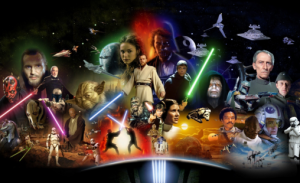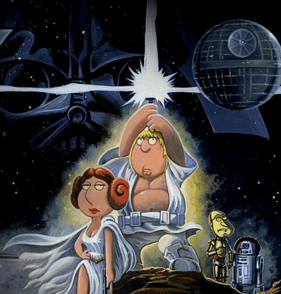In the current age, fantasy and sci-fi has a major presence and influence in modern pop-culture. Yet it can be easy for the millennial generation to forget that in their parents’ time, such a canon was hardly in the mainstream, with fantasy, sci-fi and comic books viewed worthy only for children and socially awkward teenagers. While it seems like everybody and their brother now proclaims themselves “nerds”, that term had extremely negative connotations 30 years ago, and people who indulged in “nerd culture” were social outcasts with targets painted on their backs.
Because of this, when Lucas tried to get funding for Star Wars, he was off to a rocky start. Getting a studio to agree to the film was extremely difficult, and his ultimate budget of 10 million, while no paltry sum, was very low by Hollywood standards at the time. When it was finally finished, few theaters across the country wanted to order the film, not thinking it would make any money and would be beaten out by other summer flicks. The studio was only able to get the film shown by demanding that theaters order Star Wars if they wanted the eagerly anticipated film The Other Side of Midnight. Yet when it was released in the summer of 1977, Star Wars proved to be a surprise smash hit, grossing over $775 million (compared to The Other Side of Midnight’s $25 million). It’s been followed by five films, which between them have grossed over $3 billion. It launched a major sci-fi boom in the 70s and 80s, making what used to be an extremely niche and low-budget genre a major blockbuster.
Nowadays, the sci-fi and fantasy genres have become saturated with no shortage of TV shows, movies and novels. While Harry Potter, Lord of the Rings and Game of Thrones have had a major influence on modern popular culture, it’s nearly impossible for anything to be heard above the white noise and have the lasting, universal influence and recognition of the Star Wars franchise. Phrases like the “death star”, “evil empire”, and “may the force be with you” have entered the modern vernacular and don’t seem to be going anywhere any time soon. Its impact on filmmaking is immediately recognizable, not only starting the tradition of the summer blockbuster but also revolutionizing the special effects industry and even the power of merchandising. The number of celebrity fans is numerous, and includes filmmaker Kevin Smith, Family Guy creator Seth MacFarlane, musician/comedian Weird Al Yankovic and South Park co-creators Trey Parker and Matt Stone, all of whom have incorporated their love of Star Wars into their work. One ISIS militant even cited the franchise as a favorite of his.
Regardless of how good The Force Awakens turns out to be, there’s no doubt that it will have a lasting impact on pop culture. Even the prequel films of the late 90s and early 00s, while widely criticized for being of much lower quality than the originals, were able to have a lasting influence, albeit for different reasons. Without a doubt, the next generation of filmmakers, comedians and musicians shall incorporate The Force Awakens and its upcoming sequels, along with the six pre-existing films, into their work.


